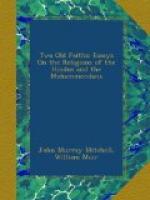“But when it
is sown, it groweth up and becometh greater than all
herbs, and shooteth
out great branches, so that the fowls of the
air may lodge under
the shadow of it."[s]
[Sidenote: Islam the work of man; Christianity the work of God.] Which is nature, and which is art, let the reader judge. Which bears the impress of man’s hand, and which that of Him who “is wonderful in counsel, and excellent in working?”
In fine, of the Arabian it may be said:
“Hitherto shalt
thou come, but no further, and here shall thy
proud waves be stayed.”
But of Christ:
“His name shall
endure forever: his name shall be continued as
long as the sun:
and men shall be blessed in him: all nations shall
call him blessed.
“He shall have
dominion also from sea to sea, and from the river
unto the ends of the
earth.
“Blessed be
the Lord God, the God of Israel, who only doeth
wondrous things.
And blessed be his glorious name forever: and
let
the whole earth be filled
with his glory. Amen, and Amen."[t]
FOOTNOTES:
[e] 1 Cor. vii, 21.
[f] Gal. iii, 26, 28.
[g] 1 Cor. vii, 22.
[h] Philemon 16.
[i] Matt. xix, 4.
[j] 1 Cor. vii, 3.
[k] 1 Thess. iv, 4.
[l] 1 Tim. v, 2.
[m] 1 Tim. ii, 9.
[n] 1 Pet. iii, 7.
[o] Luke ii, 10.
[p] Luke i, 77-79.
[q] Job xxxviii, 5.
[r] Mark iv, 26-28.
[s] Mark iv, 30-32.
[t] Psa. lxxii, 17, 8, 18, 19.
THE END.
FOOTNOTES:
[1] Barth.
[2] Bergaigne, in his able treatise, La Religion Vedique, insists earnestly on what he calls the “liturgical contamination of the myths.” See vol. iii, p. 320.
[3] R.V., ix, 42, 4.
[4] R.V., ix, 97, 24.
[5] The religion of the Indo-European race, while still united, “recognized a supreme God; an organizing God; almighty, omniscient, moral.... This conception was a heritage of the past.... The supreme God was originally the God of heaven.” So Darmesteter, Contemporary Review, October, 1879. Roth had previously written with much learning and acuteness to the same effect.
[6] Muir’s Sanskrit Texts, v, 412.
[7] R.V., iii, 62, 10.
[8] The rites, says Haug, “must have existed from times immemorial.”—Aitareya Brahmana, pp. 7, 9.
[9] Weber, History of Indian Literature, p. 38.
[10] Max Mueller, Ancient Sanskrit Literature, p. 389.
[11] “The haughty Indra takes precedence of all gods.” R.V., 1, 55.




